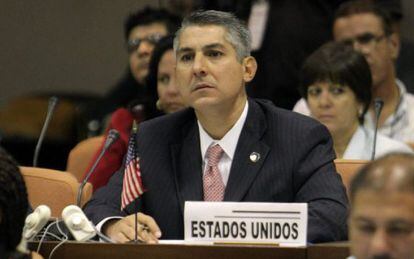The United States attends technical conference on ebola in Havana
The Bolivarian Alliance hosted the summit to coordinate efforts against the epidemic

Cuba and the United States continue to show signs of a willingness to work together on joint strategies to combat the ebola virus in West Africa and to prevent its spread throughout the Americas. On Wednesday, an American delegation attended a logistical meeting held in Havana by the member states of the Bolivarian Alliance for the Peoples of Our America (ALBA) to promote cooperation in the fight against the disease that has affected more than 10,000 people on the African continent and killed almost half of those infected.
“This is a global emergency and we all have to work together and cooperate,” said Nelson Arboleda, the director of the US Centers for Disease Control and Prevention (CDC), and one of the two US officials in attendance. The conference welcomed 254 representatives from 32 nations from the region. “We support the countries and health ministries in the Americans in order to ensure they have the adequate capacities to respond to a possible case of ebola,” Arboleda added. “We are ready to cooperate with all the actors who are working in the region to ensure an efficient response to the virus on a global level.”
This logistical meeting was organized during an extraordinary ALBA summit held on October 20 in Havana at the initiative of Cuban President Raúl Castro with the aim of coordinating efforts in the fight against the epidemic. Castro called on leftist allies to join him in the initiatives led by the United Nations and the World Health Organization. The Cuban leader said he was ready to work “shoulder to shoulder” with all the countries “including the United States.” In response, the Americans put their resources at the disposal of the Cuban government in case the country faces an infection.
Cuba promised to send 461 doctors and nurses to three of the eight African countries most affected by the virus, 256 of whom have already been working throughout Liberia, Sierra Leone and Guinea-Conakry since early October. According to a statement from Cuba’s Public Health Ministry, one its representatives, the economist Jorge Juan Guerra Rodríguez died on October 26 in Guinea due to “malaria with cerebral complications.” The government said Rodríguez, who had arrived in Africa 20 days before he died, worked as an administrator in the medical brigade. The Cuban delegation asked the room to take a minute of silence to honor the economist at the ebola conference on Wednesday.
On the other side, Mario Díaz-Balart, a US Republican representative of Cuban descent, said US officials’ presence at the conference in Havana and the American government’s praise of Cuba for sending doctors to Africa was “a scandal.” “There is nothing charitable about the Cuban dictatorship's actions in Africa. There is no comparison between American and Cuban doctors. Cuban doctors are hastily trained, poorly equipped, and forced to work in dangerous conditions while most of their pay is siphoned to the Castro dictatorship. That a U.S. official would condone their overt exploitation is outrageous," Diaz-Balart said on Thursday.
Translation: Dyane Jean François










































